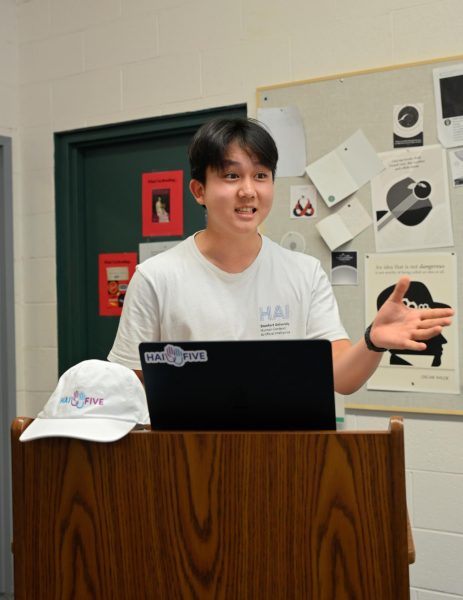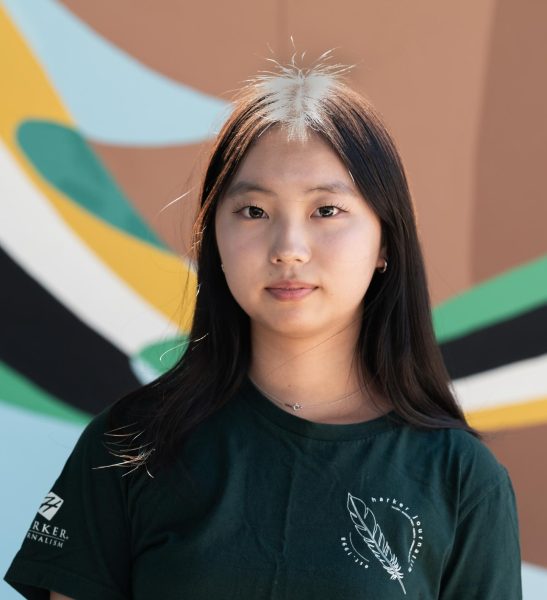
A maze of printed legislation, highlighted articles and public records spills across the table as senior Aaron Bao rapidly scribbles on a long sheet of white paper, outlining the structure for his proposed policy. Thinking intently, he weighs each contention’s impact, determined to manifest a policy impossible to refute in the chamber. In his eyes, the power of congressional debate lies not in winning trophies, but in the possibility of turning arguments into actions.
After discovering congressional debate in ninth grade, Aaron decided to switch gears from his middle school speech career and pursued his interest in debate. He found himself especially drawn to the integration of numerous perspectives within a congressional debate.
“What really interested me about congressional debate is that you’re able to make friends with people while arguing with them,” Aaron said. “You need to have an open mind about the policies and other arguments, even when you’re trying to argue your own case.”
Congressional debate’s unique emphasis on research also peaked Aaron’s interest in public policy. Whether the debate topics focused on foreign relations with Russia or domestic energy in Taiwan, Aaron continuously learned that thorough research always served as an important factor for a successful argument.
“Congressional debate has given me the ability to research something and get in-depth knowledge about it,” Aaron said. “It is very different from other events because you’re given a new docket of 20 different kinds of bills, so it has equipped me with the skills to learn about a topic very fast while gaining high quality information about it.”
However, after gaining more experience and attending numerous tournaments, Aaron realized that research by itself was not enough for a winning claim. Rather, framing his arguments as efficiently and attractively as possible proved to be a key factor for a victorious case.
“Three minutes is nowhere near enough time to get through all of the arguments you want to make,” Aaron said. “You need to focus them down and make them as persuasive and compelling as possible, and you do that through framing the issue and argument through a certain lens.”
Close friend and fellow speech and debate team member senior Robert Fields builds on Aaron’s ability to synthesize a unique argument in a pressuring environment filled with different stances. Robert particularly admires how Aaron consistently brings new ideas to the table.
“Congressional debate is like a 16 person round-robin debate, so you have to stand out,” Robert said. “Aaron’s always looking for ways to differentiate himself or bring a new perspective to the debate that no one thought of before, and that’s a very admirable quality of his.”
Through exposing himself to a variety of policies in debate, Aaron discovered his passion for AI policy during his sophomore year. To dig deeper into the topic, he joined a lab at Stanford’s Institute for Human-Centered Artificial Intelligence where he tackles the multifaceted impact of AI on the future of society, embracing both the concerns and excitement regarding the issue.
“There isn’t much concrete on what it’s actually going to affect,” Aaron said. “I was really interested in first understanding the problem of understanding the nebulous impact of AI on humans, and what the concrete solutions we can make to get the best benefit for humans and also mitigate the worst harms.”
Aaron’s research revolves around accessibility to AI development in the Global South by analyzing three crucial components for developing human-centered AI: data, computing devices and talent. He hopes to bridge the gap between technological advancement and socioeconomic challenges in growing regions through his research in AI policymaking.
“For developing countries in the Global South, they’re lacking in pretty much all three components,” Aaron said. “I’m looking at how Global South countries can develop AI and how policy can guide other countries on the global stage to ensure that AI is equitably spread so that benefits can also come to developing countries as well.”
This focus on structural change extends to Aaron’s work on student council, where he seeks to make a tangible impact. Although limitations prevent him from making sweeping reforms, Aaron advocates for attainable initiatives that can still have a meaningful influence on students’ lives.
“I see what small quality of life improvements I can do as a member of student council, especially at Harker, where everyone’s very busy and absorbed in their own world,” Aaron said. “As a representative, the best thing I can do is make their lives easier in whatever small way is possible, whether that’s having desks with chargers in Shah or having cereal available in the mornings.”
Aaron’s approach to problem solving is rooted in both structural and human-centered change. While working on global issues like equitable AI development or making smaller but equally meaningful improvements for his peers at Harker, Aaron strives to improve quality of human life through incremental progress and practical solutions.
“You have these big, nebulous structures that are really hard to tackle head on,” Aaron said. “How are you supposed to begin to understand how they’re going to influence our world? Take nuclear weapons, for example. My interests have been taking these scary ideas and then framing them around humans.”




![LALC Vice President of External Affairs Raeanne Li (11) explains the International Phonetic Alphabet to attendees. "We decided to have more fun topics this year instead of just talking about the same things every year so our older members can also [enjoy],” Raeanne said.](https://harkeraquila.com/wp-content/uploads/2025/10/DSC_4627-1200x795.jpg)


















![“[Building nerf blasters] became this outlet of creativity for me that hasn't been matched by anything else. The process [of] making a build complete to your desire is such a painstakingly difficult process, but I've had to learn from [the skills needed from] soldering to proper painting. There's so many different options for everything, if you think about it, it exists. The best part is [that] if it doesn't exist, you can build it yourself," Ishaan Parate said.](https://harkeraquila.com/wp-content/uploads/2022/08/DSC_8149-900x604.jpg)




![“When I came into high school, I was ready to be a follower. But DECA was a game changer for me. It helped me overcome my fear of public speaking, and it's played such a major role in who I've become today. To be able to successfully lead a chapter of 150 students, an officer team and be one of the upperclassmen I once really admired is something I'm [really] proud of,” Anvitha Tummala ('21) said.](https://harkeraquila.com/wp-content/uploads/2021/07/Screen-Shot-2021-07-25-at-9.50.05-AM-900x594.png)







![“I think getting up in the morning and having a sense of purpose [is exciting]. I think without a certain amount of drive, life is kind of obsolete and mundane, and I think having that every single day is what makes each day unique and kind of makes life exciting,” Neymika Jain (12) said.](https://harkeraquila.com/wp-content/uploads/2017/06/Screen-Shot-2017-06-03-at-4.54.16-PM.png)








![“My slogan is ‘slow feet, don’t eat, and I’m hungry.’ You need to run fast to get where you are–you aren't going to get those championships if you aren't fast,” Angel Cervantes (12) said. “I want to do well in school on my tests and in track and win championships for my team. I live by that, [and] I can do that anywhere: in the classroom or on the field.”](https://harkeraquila.com/wp-content/uploads/2018/06/DSC5146-900x601.jpg)
![“[Volleyball has] taught me how to fall correctly, and another thing it taught is that you don’t have to be the best at something to be good at it. If you just hit the ball in a smart way, then it still scores points and you’re good at it. You could be a background player and still make a much bigger impact on the team than you would think,” Anya Gert (’20) said.](https://harkeraquila.com/wp-content/uploads/2020/06/AnnaGert_JinTuan_HoHPhotoEdited-600x900.jpeg)

![“I'm not nearly there yet, but [my confidence has] definitely been getting better since I was pretty shy and timid coming into Harker my freshman year. I know that there's a lot of people that are really confident in what they do, and I really admire them. Everyone's so driven and that has really pushed me to kind of try to find my own place in high school and be more confident,” Alyssa Huang (’20) said.](https://harkeraquila.com/wp-content/uploads/2020/06/AlyssaHuang_EmilyChen_HoHPhoto-900x749.jpeg)



